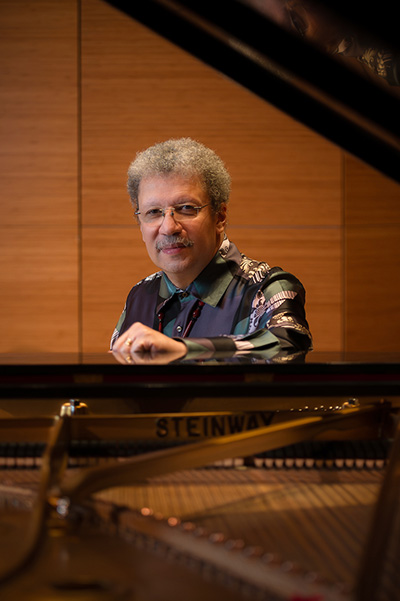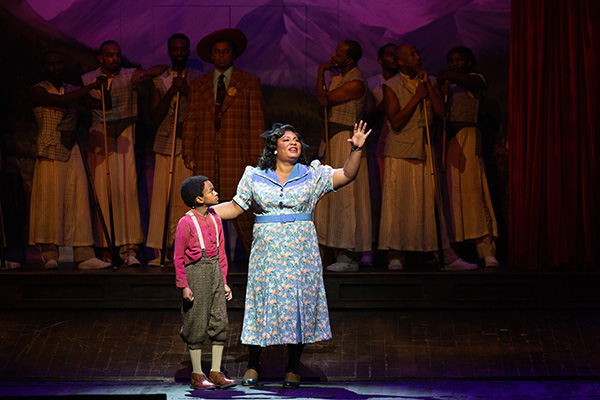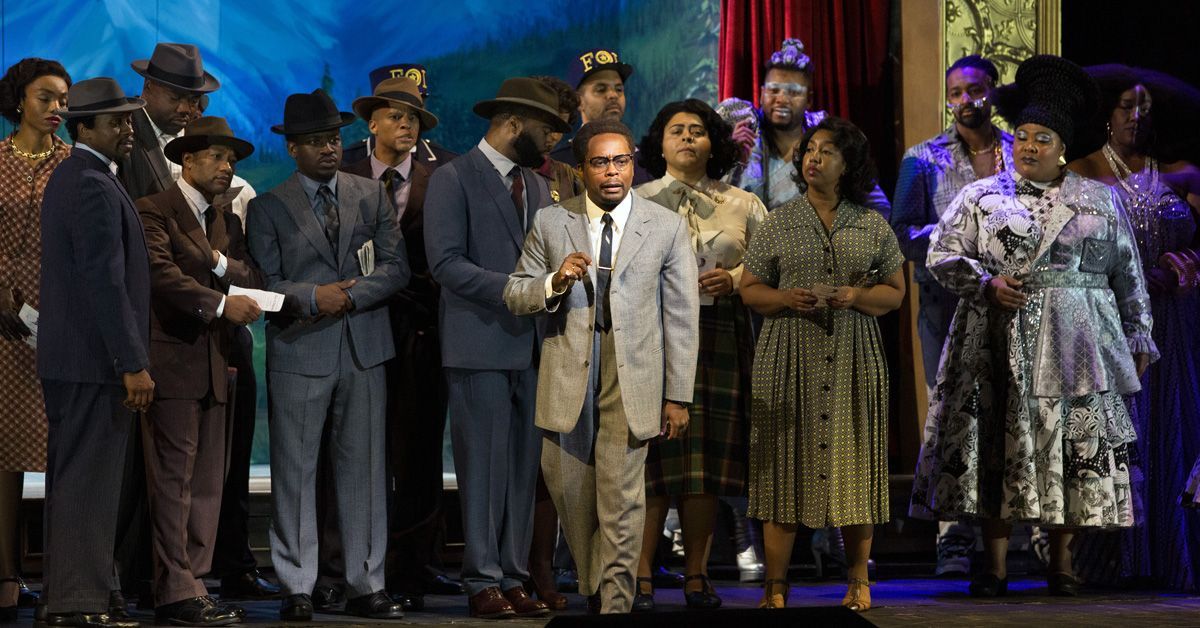A Standing Ovation for Opera Icon Anthony Davis
UC San Diego’s pioneering composer is inducted into the Opera Hall of Fame
Story by:
Published Date
Article Content
This January, UC San Diego Distinguished Professor of Music Anthony Davis was inducted into the Opera Hall of Fame. The honor comes on the heels of an immensely successful production of “X: The Life and Times of Malcolm X” at the Metropolitan Opera, a work he composed 37 years ago, and which drew packed houses nearly nightly. “It was a fantastic experience, one of the highlights of my life,” he shared.
A Pulitzer prize-winning musician who has written eight operas thus far, Davis is unafraid to spotlight some of society’s most pervasive problems—from racism and police brutality to immigration reform and political unrest. Yet the weighty topics are counterbalanced by a sense of play and an affinity toward “trickster” characters that are difficult to pin down. His four-decade dedication to composing music that elevates unsung voices contributed to his selection by Opera America as an artist who has strengthened the field—one of only five composers to be honored in the history of the award.

“Professor Davis is a hugely important voice in contemporary American music; he has built a body of work that weaves together a broad range of musical influences and performance practices,” said Professor and Chair of Music Anthony Burr. “He has never shied away from direct engagement with political realities, especially in his operas. The recent surge of interest in and recognition of his music is long overdue — the world is finally catching up with his eminence as an artist.”
Audiences and critics alike are drawn to the way Davis uses music as resistance and creates a whole world on stage through sound. Last November the production of “X” contributed to an important shift at the historically conservative Met, attracting new audiences to the opera house. Davis represents the second Black composer to be featured, as well as the first UC San Diego music professor to produce an opera at the Met.
“It was to me a very uplifting experience,” said Davis. “The audience response was amazing. It was sold out at nearly every performance. I was told that 60 percent of the house was under the age of 40, with more African American and Hispanic participation.”
The latest production of “X” was unlike anything Davis had seen before. And being able to collaborate with his brother and cousin made the project even more meaningful.
‘I think it’s an opera’
Two dozen choristers were dressed in elaborate outfits blending science fiction and African costume. Twenty dancers moved to the rhythms of Brazilian capoeira, American Lindy Hop swing and Calinda martial arts. And a massive spaceship was suspended above, serving as a link to a more hopeful future while also transforming into a canvas depicting images from Malcolm’s life as well as the names of victims of police brutality.
“This was the most lavish production by far,” said Davis. “What [Director] Robert O’Hara brought was this Afro-futurist perspective. A spaceship crashes into the Met, and it’s as if African Americans from the future come to find out about Malcolm X.”

It was a full circle moment for Davis. “X” first opened in 1986 at the New York City Opera (now the David H. Koch Theater), just a few blocks away from the Met. The original idea for the opera was inspired by his brother, actor and director Christopher Davis, who played Malcolm X in a college play and suggested that it could make a compelling musical. Davis responded, “I think it’s an opera.”
To create the story, the siblings reached out to their cousin, Thulani Davis. A Grammy award-winner whose work spans playwriting, screenwriting, poetry and journalism, she quickly became a critical team addition as librettist (whose role is to write the script and lyrics for an opera).
The resulting opera is not biographical per se, but rather delves into the activist’s interior, emotional world. The three acts correspond to the major identities and philosophies that Malcolm X adopted in his lifetime—from Malcolm Little and Detroit Red to Malcolm X and el-Hajj Malik el-Shabazz—each period threaded together by music.
Following the opening, theater critics praised the dynamism of the music, the spectacular stage design and the singer’s memorable performances. “All these elements cohere into a grand, pageantry treatment of Malcolm X’s life that eschews realism for dreamy abstraction befitting the opening’s oratorio-like choral incantation…” reported the New York Times.
Sustaining a sense of play
Davis has had opera on his mind since high school. The first idea for an opera composition came to him after reading Ralph Ellison’s “Invisible Man”; he’s currently pursuing the rights to manifest his dream of composing a work based on the text.
But that’s not all he’s working on. Once more collaborating with his cousin, Thulani, he is creating an opera called “Fire Across the Tracks” about the Tulsa race massacre. Additionally, Davis is also developing a work called “Pancho Rabbit and the Coyote,” a children’s opera (based on the book with the same title) with animal characters that center on the lives of a migrant family in Mexico. “I want to do it in a lighthearted way,” explained Davis. “There will be a wall being built by an orange snapping turtle, guarded by snakes. Our plan is to premiere it in San Diego and Tijuana.”
This sense of play and penchant for pursuing new ideas was strengthened as a faculty member at UC San Diego. After spending 20 years in New York City, Davis joined the Department of Music in 1996. In addition to enjoying teaching, he reveled in creative freedom. “I had time to think, develop new ideas and grow as a composer,” he said. “The university has been very supportive of my creative activity and value my personal research.”
In a gesture of that support, Davis was named the Cecil Lytle Chancellor’s Endowed Chair in African and African American Music, which enables him to invite prominent performers to campus to engage with his students, conduct research for new operas as well as cover travel expenses related to performance events.
“Davis’s latest honor is a testament to his prolific and pioneering work in powerful storytelling that synthesizes music and political activism for the common good,” said Dean of the School of Arts and Humanities Cristina Della Coletta. “Davis was selected as inaugural chairholder in 2022, and since then has continued to produce groundbreaking work that pushes the boundaries of his field while giving back directly to our students and campus community. We congratulate him in this well-deserved distinction.”
The endowment is especially significant to Davis because he was mentored by Cecil Lytle, emeritus professor of music, as a new faculty member. “Cecil is an incredible musician who has had a profound impact on this campus, including the creation of The Preuss School and serving as provost of Thurgood Marshall College,” said Davis. “He’s one of the most important figures in the history of the university. I feel honored that it’s in his name.”
Never standing still, Davis is already preparing for the next production of “X,” which will open at the Seattle Opera on Feb. 24. The moment is aptly described in the New York Times as long overdue, “With performances planned long after the run in New York, it has the opportunity to become what it always should have been: an American classic.”

You May Also Like
Stay in the Know
Keep up with all the latest from UC San Diego. Subscribe to the newsletter today.




